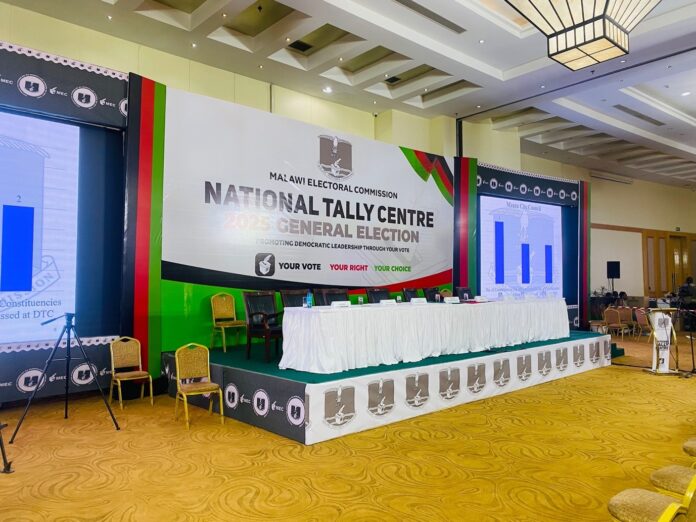Malawi’s successful navigation of the 2019-2020 electoral crisis is viewed as a model for democratic resilience in the region.
But have the ghosts of 2020 returned to haunt Malawi again?
MakanDay’s Special Correspondent in Lilongwe reports.
A week after Malawi’s September 16th general election, an electoral crisis is unfolding. It threatens to undermine the democratic gains made since the historic 2020 court-ordered rerun.
Multiple political parties have lodged formal complaints with the Malawi Electoral Commission (MEC), citing widespread irregularities and systematic failures that eerily echo the chaos of the 2019 elections that were ultimately nullified by the courts.
A Pattern of Failures Emerges
The governing Malawi Congress Party (MCP), led by incumbent President Lazarus Chakwera, has emerged as the most vocal critic of the electoral process.
On September 19, the party announced it had uncovered evidence of irregularities spanning 13 of Malawi’s 28 districts.
Vitumbiko Mumba, Chakwera’s Running Mate, confirmed that the party has lodged a formal complaint with MEC, demanding a comprehensive physical audit of results in areas where “serious anomalies” were discovered.
The allegations extend far beyond simple administrative errors.
MakanDay sources suggest a coordinated effort to manipulate results, with particular concern focused on four key districts: Mangochi, Machinga, Ntcheu, and Nkhata Bay.
Results from these constituencies were effectively quarantined by MEC, with officials citing the need for “verification” before release.
The Ghost of 2019 Returns
The current crisis bears uncomfortable similarities to the 2019 elections, which were ultimately nullified by Malawi’s Constitutional Court.
During that electoral debacle, judges cited “widespread, systematic and grave” irregularities, including the infamous use of correction fluid (Tipp-Ex) on result tally sheets.
The Court’s decision, upheld by the Supreme Court, was hailed internationally as a triumph for democratic accountability and led to Chakwera’s historic victory in the 2020 rerun.
Now, five years later, similar accusations are emerging.
Multiple sources within the electoral process have reported instances of counterfeit result forms appearing alongside missing original documentation.
In some cases, duplicate tally sheets have been discovered, raising questions about the integrity of the entire tallying process.
MEC Under Fire
The Malawi Electoral Commission finds itself at the center of mounting criticism over its handling of the election.
Beyond the quarantined results in the four districts, the commission has faced accusations of compromised neutrality and systemic failures in result delivery.
The delayed announcement of official results has only fueled speculation about behind-the-scenes manipulation.
Police intervention has added another layer of complexity to the crisis.
Eight election data entry clerks in the Lilongwe area have been arrested on suspicion of “manipulating data,” according to official sources.
While authorities have not provided detailed information about the nature of the alleged manipulation, the arrests have reinforced concerns about the integrity of the electronic tallying system.
Opposition Voices Join the Chorus
The MCP is not alone in its concerns.
The United Democratic Front (UDF), led by Atupele Muluzi, has documented irregularities across multiple districts, including vote figures that allegedly do not match the number of registered voters, technical failures of election machines, and altered vote tallies.
Traditional leaders in Blantyre have also petitioned MEC, citing voting irregularities in the South Lunzu Constituency.
The breadth of complaints suggests this is not merely post-election positioning by losing parties, but potentially indicative of systemic failures within Malawi’s electoral apparatus.
A Democracy Under Strain
The current electoral crisis comes at a particularly sensitive time for Malawi’s democracy.
The country’s successful navigation of the 2019-2020 electoral dispute is viewed as a model for democratic resilience in the region.
However, the emergence of similar patterns of irregularities raises questions about whether the fundamental issues that plagued the 2019 elections were ever fully addressed.
Human Rights Watch warned as early as August 2025 that without urgent intervention from domestic institutions and regional actors, Malawi risked “descending into a cycle of contested legitimacy and democratic decay.”
Those warnings now appear prescient as the country grapples with yet another disputed election outcome.
The Road Ahead
As investigations continue and legal challenges mount, Malawi finds itself at a democratic crossroads.
The MEC’s handling of the current crisis will likely determine not only the legitimacy of the 2025 elections, but also the long-term health of the country’s democratic institutions.
With preliminary results showing former President Peter Mutharika of the Democratic Progressive Party (DPP) leading with 2,022,955 votes at the time of writing, several presidential candidates have already conceded defeat.
Joyce Banda of the People’s Party (PP) and Dalitso Kabambe of the United Transformation Movement (UTM) have both congratulated Mutharika on his projected victory, demonstrating a level of acceptance that contrasts sharply with the ongoing disputes over electoral irregularities.
However, the stakes remain extraordinarily high given the scale of complaints lodged by the governing MCP.
If the irregularities prove substantial enough to warrant legal intervention, Malawi may face another rerun election.
Despite some candidates’ willingness to accept the preliminary results, such a scenario could further strain public confidence in the electoral system.
Closely watching is the international community. With regional bodies and development partners expressing concern about the unfolding situation, for a country that once stood as a beacon of electoral justice in Africa, the current crisis represents not just a political challenge, but a test of the resilience of democratic institutions in the face of sustained pressure.

Discover more from MAKANDAY
Subscribe to get the latest posts sent to your email.



